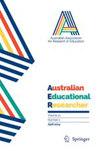A National Study Exploring Factors Promoting Adolescent College Readiness in Math and Science (STEM-CR)
IF 2.4
3区 教育学
Q2 EDUCATION & EDUCATIONAL RESEARCH
引用次数: 0
Abstract
Numerous national and state endeavors have advocated for approaches, funding, and programs focused on expanding the science, technology, engineering, and mathematics (STEM) workforce of the nation and investing in education to cultivate a more diverse and impactful cohort of students who pursue STEM pathways. Educators, support personnel, and policymakers are in a position to engage in discussions about expanding STEM college readiness (STEM-CR) and participation. However, few are cognizant that STEM-CR is a progression that students strive for in developing skills, behaviors, and attitudes that spans over time. The current study established and validated a measurement model of student STEM-CR in mathematics and science utilizing the High School Longitudinal Study of 2009. The model was created based on a multidimensional and theoretical perspective of college readiness using a confirmatory factor analysis and modeling approach that accounted for measurement invariance. The sample ( N = 16,044) comes from a racialized/ethnoracial and socioeconomically diverse high school population in the United States. The findings confirmed that STEM-CR involves four related yet distinct dimensions of Think, Know, Act, and Go. Results also demonstrated soundness of these STEM-CR dimensions by race and gender (key learning skills and techniques/Act). Academic self-efficacy was the strongest dimension of our STEM-CR model and strongly predicted academic achievement and college enrollment. Research and practice implications are discussed.促进青少年数学和科学大学入学准备因素的全国性研究(STEM-CR)
许多国家和州都在努力倡导方法、资金和计划,重点是扩大国家的科学、技术、工程和数学(STEM)劳动力,并投资于教育,以培养更多样化、更有影响力的学生群体,他们追求STEM道路。教育工作者、支持人员和政策制定者可以参与有关扩大STEM大学准备(STEM- cr)和参与的讨论。然而,很少有人认识到STEM-CR是学生在发展技能、行为和态度方面的一个跨越时间的进步。本研究利用2009年的高中纵向研究,建立并验证了学生数学和科学STEM-CR的测量模型。该模型基于大学准备的多维理论视角,采用验证性因子分析和建模方法,考虑了测量不变性。样本(N = 16044)来自美国种族/民族和社会经济多样化的高中人口。研究结果证实,STEM-CR涉及思考、了解、行动和行动四个相关但不同的维度。结果还显示了这些STEM-CR维度按种族和性别划分的合理性(关键学习技能和技巧/行为)。学业自我效能感是STEM-CR模型中最强的维度,对学业成绩和大学入学率有很强的预测作用。讨论了研究和实践意义。
本文章由计算机程序翻译,如有差异,请以英文原文为准。
求助全文
约1分钟内获得全文
求助全文
来源期刊

Australian Educational Researcher
EDUCATION & EDUCATIONAL RESEARCH-
CiteScore
4.60
自引率
14.30%
发文量
81
期刊介绍:
The Australian Educational Researcher is the international, peer reviewed journal published by AARE. The Australian Educational Researcher is published three times a year and is a Thomson (ISI) indexed journal. The aim of AER is to:Promote understandings of educational issues through the publication of original research and scholarly essays.Inform education policy through the publication of papers utilising a range of research methodologies and addressing issues of theory and practice.Provide a research forum for education researchers to debate current problems and issues.Provide an international and national perspective on education research through the publication of book reviews, scholarly essays, original quantitative and qualitative research and papers that are methodologically or theoretically innovative.AER welcomes contributions from a variety of disciplinary perspectives on any level of education.
 求助内容:
求助内容: 应助结果提醒方式:
应助结果提醒方式:


